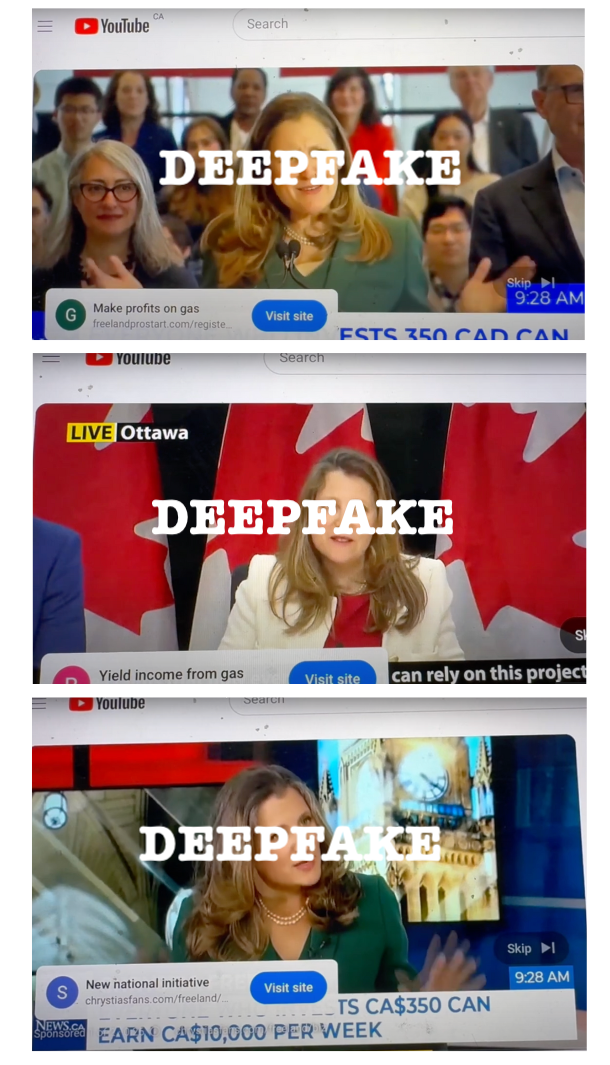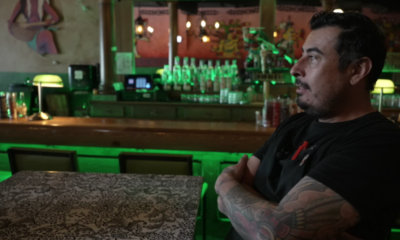News
Exclusive: Google says it cracked down on Chrystia Freeland deepfakes

Bob Mackin
YouTube’s guardian firm says it’s taking motion to cease deepfake adverts that painting Canadian finance minister Chrystia Freeland flogging a get wealthy fast scheme.
Liberal Finance Minister in deepfake movies seen on YouTube (YouTube)
theBreaker.information reported June 11 in regards to the adverts, discovered inadvertently Could 31 on YouTube. The clips present Freeland, who can also be the Deputy Prime Minister to Justin Trudeau, in adverts which are packaged as reviews on TV information channels. However they have been generated by synthetic intelligence (AI). A spokesperson for Freeland known as the movies, and related web sites, pretend and rife with false and deceptive data. (SEE THE DEEPFAKE CLIPS BELOW.)
A Google spokesperson, citing firm coverage, offered touch upon situation of anonymity.
“Defending our customers is our high precedence and we’ve strict insurance policies that govern the adverts and content material on our platform,” stated the Google assertion. “These scams are prohibited and we’re terminating the adverts accounts and channels behind them. We’re investing closely in our detection and enforcement towards rip-off adverts that impersonate public figures and the dangerous actors behind them.”
The supply video for one of many Freeland clips was an April 7 Toronto information convention the place she sarcastically introduced $2.4 billion taxpayer funding to spice up Canada’s AI sector. Final November, Google agreed to pay $100 million a 12 months, plus inflation, to Canadian media shops with the intention to be exempt from the Liberal authorities’s On-line Information Act. The controversial legislation is also referred to as a tax on internet hyperlinks.
Google says it has long-prohibited the usage of deepfakes and different types of doctored content material that intention to deceive, defraud or mislead customers about political points. It requires person verification and employs human reviewers and machine studying to observe and implement polices. Of the 5.5 billion adverts it eliminated final 12 months, 206.5 million contravened the corporate’s misrepresentation coverage. It additionally suspended greater than 12.7 million advertiser accounts.
Mac Boucher, an AI content material era professional and accomplice in L.A.-based KNGMKR, spoke June 12 on the Hint Basis and Vancouver Anti-Corruption Institute’s Journalism Beneath Siege convention in Vancouver.
Boucher confirmed a reel of deepfake movies made with the pictures and audio clips of celebrities corresponding to Christopher Walken and Morgan Freeman. He cited the favored PlayHT program for instance.
“You feed it a video file or an audio file that I simply rip off the web. It takes a second to course of and generally it messes up,” Boucher stated. “However, then primarily, you could have a TTS mannequin, which is text-to-speech, the place you’ll be able to kind something you need, you’ll be able to add sentiment to it, completely happy, unhappy, fearful, shocked, and so on. It is going to begin to have the ability to generate, oftentimes fairly dangerous generations, however it takes a bit of little bit of tuning and tweaking and modifying to make it come out much more naturally.”
Boucher, the brother of musician Grimes, stated AI is affordable to provide. Disinformation is the disadvantage, however that’s best when “individuals now not consider in a system that isn’t actually working of their finest pursuits, or on the look that’s of their finest pursuits.”
“The web might be simply going to look loads like Occasions Sq. as of proper now, which isn’t actually a spot that individuals spend numerous time. It simply attracts tons of vacationers and other people simply passing via,” Boucher stated.”Then there’s going to be small neighbourhoods which have requirements of excellence for regardless of the information.”

Mac Boucher (LinkedIn)
Some governments are slowly pondering regulation of the fast-evolving know-how. California state senator Invoice Dodd tabled the AI Accountability Act to manage AI use by state businesses, together with transparency of its use and push for state-funded AI training.
The Canadian Anti-Fraud Centre (CAFC) warned in a March bulletin that deepfakes use “machine-learning algorithms to create realistic-looking pretend movies or audio recordings. That is mostly seen in funding and merchandise frauds the place pretend celeb endorsements and faux information are used to advertise the fraudulent gives.”
In Could, the U.S. Federal Communications Fee proposed a $6 million high quality for political marketing consultant Steve Kramer who was behind robocalls two days previous to the first-in-the-nation presidential major in New Hampshire. These robocalls featured deepfake audio utilizing President Joe Biden’s voice to encourage residents to abstain from the first and save their vote for the November presidential election.
Kramer was additionally arrested in New Hampshire on bribery, intimidation and voter suppression expenses.
Toronto-based Marcus Kolga of DisinfoWatch.org is anxious that the know-how is advancing so quickly that deepfake movies might develop into undetectable and finally be utilized by dangerous actors to trigger monetary manipulation and geopolitical disruption on a mass-scale.
“This know-how is barely bettering and it’s bettering not yearly, it’s bettering each month,” Kolga stated.
Help theBreaker.information for as little as $2 a month on Patreon. Learn the way. Click on right here.
-

 News4 weeks ago
News4 weeks agoMufasa: The Lion King – six key things to know before watching the prequel | Ents & Arts News
-

 News4 weeks ago
News4 weeks agoHow ‘A Complete Unknown’ Brings Bob Dylan’s 1960s New York Back to Life
-

 News4 weeks ago
News4 weeks agoDenver chef brings new culinary twist to Mexican American pozole traditions
-

 News3 weeks ago
News3 weeks agoWill Smith’s Superhero Dream Is Realized As He Becomes Wakanda’s Protector In MCU Concept Trailer
-

 News4 weeks ago
News4 weeks agoMerry Christmas from Answers in Genesis
-

 News2 weeks ago
News2 weeks ago‘Home Improvement’ star out on bond after arrest in Myrtle Beach
-

 News4 weeks ago
News4 weeks agoAs we celebrate Christmas, set a place at the festive table for memories • Kansas Reflector
-

 News4 weeks ago
News4 weeks agoNFL DFS: Optimizer unveils Week 16, 2024 daily fantasy football lineups, projections for DraftKings, FanDuel
